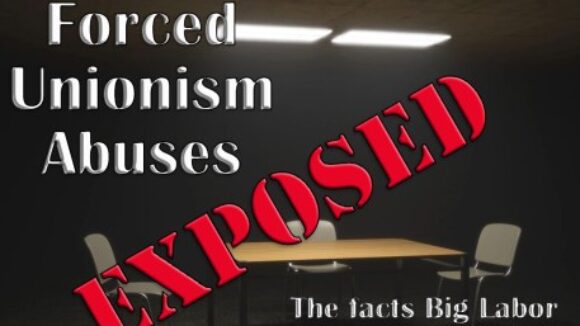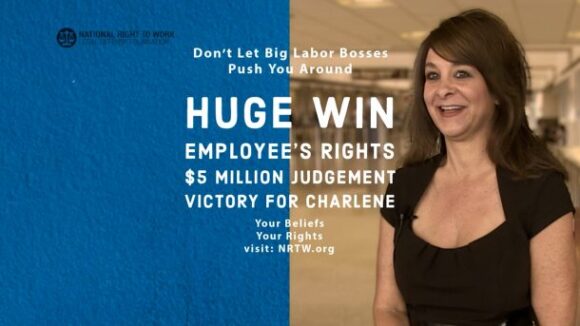Biden Bureaucrats Move to Gut Constitutional Right to Work Protections For Federal Employees
When Right to Work advocates made their first valiant, although diffuse, efforts to stop the spread of government-imposed compulsory union membership…
Forced Unionism Abuses Exposed – the facts Big Labor Bosses would rather you didn’t hear about.

“[C]ompulsory unionism and corruption go hand in hand . . . .”
— U.S. Sen. John McClellan (D-Ark.)
Big-spending International Association of Fire Fighters (IAFF/AFL-CIO) union President Harold Schaitberger and his crony Thomas Miller, the former IAFF secretary-treasurer, are saying very little on the record regarding a federal criminal probe spurred in part by allegations that they together illegally siphoned off well over a million dollars in pension payments from the union while both were still employed by the union.
However, since a September 3 news article in the Wall Street Journal reported for the first time that the FBI, the U.S. Attorney’s Office in Washington, D.C., and the U.S. Labor Department had “issued subpoenas” to the IAFF union and to Miller, Schaitberger allies in the union hierarchy have made their views crystal clear.
And what Schaitberger apologists have asserted is, to say the least, deeply disturbing.
Schaitberger’s compensation package as honcho of the IAFF is overwhelmingly funded by dues collected from firefighters who are subject to union monopoly bargaining over their terms and conditions of employment. It has always been lavish, and is now reportedly in excess of $500,000 a year.
But he has clearly thought he deserved more than he got at the union rank-and-file’s expense. As a Journal news article published late in June explained, at the time Schaitberger assumed the presidency in 2000, IAFF rules “disallowed drawing pension payments until retirement.”
Schaitberger and Miller didn’t care. They arranged to start receiving monthly pension checks, along with their hefty salaries, almost as soon as they were in office. From 2000 to 2015, Schaitberger alone “received about $1.2 million from his pension plan.” The following year, the payments temporarily ceased when Miller’s successor as secretary-treasurer, Edward Kelly, ruled that the payments were not allowed. But Schaitberger eventually prevailed upon the IAFF board to reinstate them, and he and his ex-wife are now raking in “roughly $9,000 total each month in benefits, according to union officials.”
Because Kelly blew the whistle, the Schaitberger pension payments became the subject of an internal union investigation long before federal authorities got involved. On September 22, Rachel Cohen reported in the Intercept on the contents of the review conducted by a specially appointed committee of union officials.
The 22-page report, in Cohen’s words, did “not say definitively” whether Schaitberger had “improperly received” pension payments. It “acknowledged the federal government” may “find wrongdoing” by him. But even if federal law enforcement concludes Schaitberger piled up pension benefits to which he wasn’t entitled, he “should not personally be on the hook for it”!
To put it bluntly, the IAFF brass is sending a clear signal: Any penalties for the misdeeds of Schaitberger (who abruptly announced on September 29 he would not seek another term in union office once his current one expires in January) and Miller that are ultimately imposed will come out of the dues money of firefighters who didn’t do anything wrong, rather than out of the Big Labor perpetrators’ pockets.
The so-called “resolution” of the IAFF’s internal probe should leave no doubt in the minds of honest rank-and-file union members that the union must be defunded before it does any more damage.
Fortunately, thanks to the National Right to Work Legal Defense Foundation’s landmark U.S. Supreme Court victory in Janus just over two years ago, public-sector employees in all 50 states, along with private-sector workers in the 27 states with Right to Work laws, now are free to get and keep a job without being forced to bankroll a union.
If enough firefighters express their outrage at union bigwigs by exercising their legal right to resign from the IAFF and cut off financial support for it, the union board will ultimately have no choice but to stop allowing Big Labor bosses to use the union treasury as their personal piggy bank.
Unfortunately, rank-and-file private-sector employees who live and work in one of the 23 states without a Right to Work statute or constitutional provision may still face firing if they choose to stop sending dues or fees to shady union bosses. That’s a key reason why National Right to Work Committee members continue to fight hard for passage of a national Right to Work law, under which such firings would be prohibited across the country.

When Right to Work advocates made their first valiant, although diffuse, efforts to stop the spread of government-imposed compulsory union membership…

Years ago, the ILA was identified by the President’s Commission on Organized Crime as one of a handful of international unions with “histories of control or influence by organized crime.”...

Flight Attendant Triumphs Over TWU Union and Southwest in Suit About Illegal Firing; Jury Awards $5.1 Million in Damages TWU union…